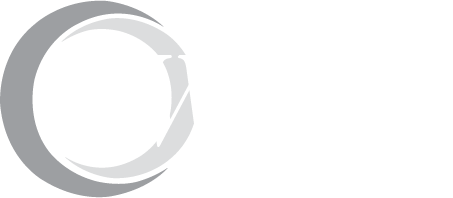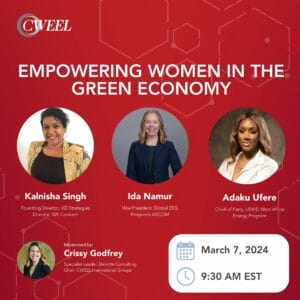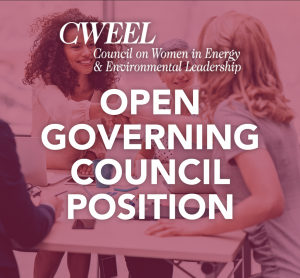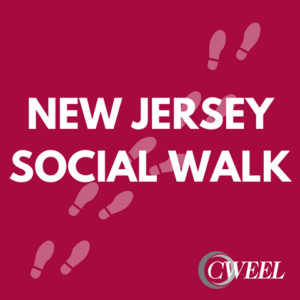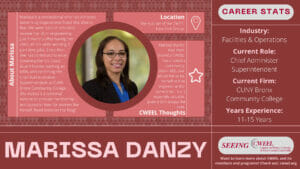
SEEING CWEEL: MARISSA DANZY
In Her Own Words
What is a fun fact about you?
I have a twin and I was once a professional double dutch jumper; a speed jumper to be exact for Stan’s Pepper Steppers out of Far Rockaway, Queens, NY. Most of my early lessons about teamwork and leadership came from participating on this team, training six days a week for over 13 years until college. Whenever I can I visit my coach and the younger jumpers now and try to offer mentorship and advice.
Do you have a quote that has inspired you?
Make us to choose the harder right, instead of the easier wrong and never be content with a half truth when the whole can be won. ~The Cadet Prayer
What is the best advice you received as a woman in energy?
There’s no crying in Facilities! ~ Pat Johnson
What made you join CWEEL in the first place?
It’s a personal mission of mine to promote women in my field of Engineering by providing quality engineering solutions and being a part of the change I expect to see. I joined CWEEL because the idea of a network of women interested in similar fields collaborating on professional development and mentorship opportunities really attracted me. Whether it’s volunteering for an employee resource network at my organization, being an alumni ambassador mentoring students at my alma maters, or showing up at every career day I’ve been invited to so the students can meet the “lady engineer,” and see that Engineering is no longer a boys club, I show up to represent the possibility of success for people like me.
What has been the biggest benefit of being a CWEEL member?
The biggest benefit of joining CWEEL for me has been being invited to speak on a panel about my experience in the industry as a woman of color. My experience is unique, growing up in the impoverished and underserved suburbs of Far Rockaway, Queens on the outskirts of NYC, from which I used my intellect and determination to gain access to higher education and become an Engineer, MBA and Facilities Management Professional. However, I face similar adversities to other BIPOC professionals, such as not having mentors who look like me, how my natural hair and how I style it affects how I’m viewed professionally, and how financial disparities play out in the professional setting and can determine access to opportunities for advancement. I’ve synthesized a way to step into my discomforts to develop meaningful relationships with experienced mentors in my field, speak up for my professional needs and goals with data and analysis on my side and to solve intimidating problems by breaking them down into bite size pieces. I want to share those lessons learned and strategies with anyone who thinks they can benefit.
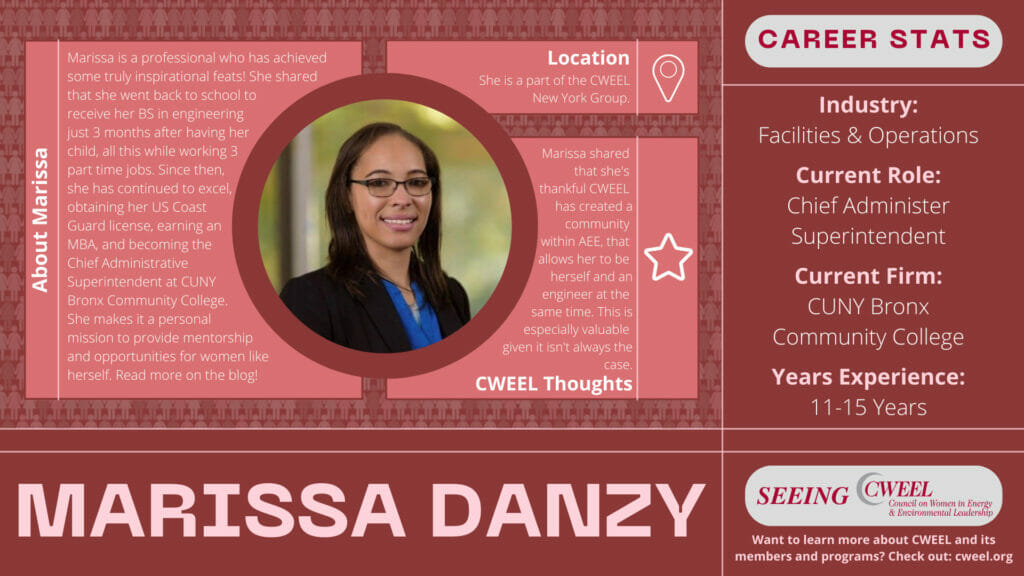
Many people are unfamiliar with the many, varied roles out there. We would love to hear more about your roles from the start of your career through today. It is always interesting to showcase how people came to be where they are, what their motivations were at different points, influences, etc. Share as much of your story as you would like, below.
My career really began in college while training in the Midshipman Under Guidance, regimented program at SUNY Maritime College. I trained on a steamship to get hands on knowledge, fulfilling requirements for the U.S. Coast Guard to become a licensed engineer to work on ships of any tonnage. Although I earned my license I never got to use it, because life hit me hard in college. I became a parent in my junior year of college, which became the first pivot point in my life.
Not seeing it as an option to leave my toddler ashore for a life at sea I entered the facilities industry as a building Superintendent, mostly because it came with an apartment and I had become homeless shortly after college ended. My first job was at a supportive housing apartment building in the South Bronx. I managed the day to day facilities and projects including plumbing, carpentry, painting, some light electrical, flooring, appliance repair and HVAC maintenance. The tenants and the work was challenging. In this role I learned to deal with difficult people and in my own way I found common ground with my tenants who were also my neighbors. I continued to get additional certifications and volunteer at alumni events. I couldn’t afford to get opportunities to network with successful alumni from all over the world and in several different industries.
I made my first big break when I landed a job at Memorial Sloan Kettering Cancer Center (MSK) after meeting and networking with a senior leader at an alumni event and discussed opportunities at the organization. As an Engineering Manager at MSK I managed up to 22 locations in my time there, met some wonderful women in the employee resource group named Women on the Move and found mentorship from several women who were senior leaders at the organization. While at MSK I earned my MBA from Syracuse University and was ready for more responsibility and senior leadership roles that were not available at the organization at the time.
Earning my MBA changed my perspective on what I expect from my employer and my workplace. My standards are higher than ever and I like to say that when I move to an organization that they are on probation as much as I am. It must be a good fit for my professional goals and skill set, as much as my personality, work ethic and morals. I’ve moved around a bit since MSK, worked at other healthcare organizations, including Northwell Health and St. Barnabas Hospital during the pandemic, and an engineering training startup, Enhanced Building Solutions, making use of my MBA to help develop business operations. Recently, I transitioned to my new home as the Chief Administrative Superintendent at CUNY Bronx Community College where I supervise the buildings, grounds, physical plant and staff that care for the facilities. Go Broncos!
What achievements, projects, or presentations are you proud of?
If I have to choose, then it’s getting my U.S. Coast Guard license in college as a new mom because going back to finish my studies after having a child was the most challenging experience of my life. I worked three part time jobs to help support my family and barely saw my child as an infant and toddler because I was several states away. However, I finished what I had started and am truly proud of myself for pushing beyond my limits.
